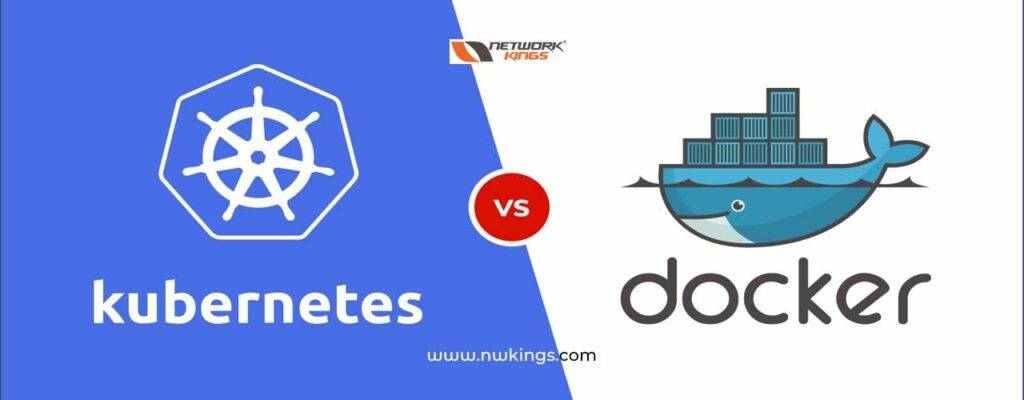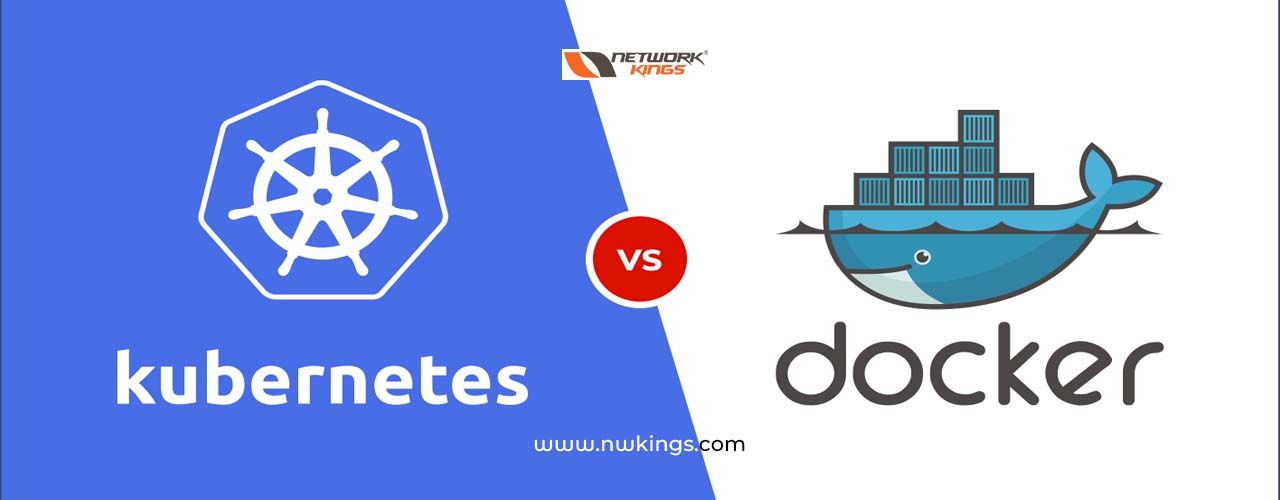
Kubernetes vs Docker– which path you should choose? In recent years, the use of containerization technologies has become increasingly popular among developers and DevOps teams. Two of the most widely used containerization platforms are Kubernetes and Docker. While both serve the purpose of managing and deploying containers, they have distinct differences that make them suitable for different use cases.
This blog post aims to provide a comprehensive comparison of Kubernetes and Docker, explaining their functionalities, highlighting their differences, and helping you decide which one is better suited for your specific needs.
What is Kubernetes?
Kubernetes is an open-source container orchestration platform developed by Google. It provides a framework for automating the deployment, scaling, and management of containerized applications. Kubernetes allows you to manage multiple containers across multiple hosts, providing advanced features for load balancing, service discovery, and fault tolerance.
What is Docker?
Docker, on the other hand, is an open-source containerization platform that allows you to package applications and their dependencies into standardized units called containers. It provides an isolated environment for applications to run consistently across different environments, regardless of the underlying infrastructure. Docker simplifies the process of building, distributing, and running applications inside containers.
Kubernetes vs Docker- Which is Better?
Kubernetes and Docker are both key elements of modern containerization and cloud-native development, but they perform various objectives and operations in other parts of the container ecosystem. Comprehending their distinctions is important for anyone interested in DevOps, cloud computing, or application development. Here’s an analysis of the key differences between Kubernetes and Docker.
Docker
- Primary Function: Docker is a platform and tool for creating, disseminating, and operating Docker containers. It allows you to package an application with all of its dependencies into a standardized unit for software development, known as a container.
- Container Creation: Docker delivers the runtime environment for containers. It allows developers to split applications from their environment and provides consistency across multiple development, release cycles, and environments.
- Simplicity and Individual Containers: Docker is known for its simplicity and ease of use, especially for individual containers. It’s often the first tool developers know in the container ecosystem.
- Docker Swarm: Docker presents its clustering tool called Docker Swarm. It lets Docker containers be organized across numerous nodes, but it’s less feature-rich compared to Kubernetes.
Kubernetes
- Primary Function: Kubernetes is an orchestration system for Docker containers (and others). It automates the deployment, scaling, and control of containerized applications.
- Cluster Management: Kubernetes concentrates on the clustering of containers. It groups containers that make up an application into logical units for easy control and discovery.
- Complexity and Scalability: Kubernetes is more complicated than Docker but delivers more powerful features for handling containers at scale. It’s created to manage high availability, defect patience, and scalability, which are important in production environments.
- Ecosystem and Community: Kubernetes has a big and active community. It’s part of the Cloud Native Computing Foundation (CNCF), which provides it with compatibility with many other environments and cloud providers.
- Complementary Technologies Working Together: In practice, Docker and Kubernetes are not mutually exclusive. Docker can be used to make containers, and Kubernetes can be used to control those containers in a production environment.
- Popularity in Cloud Environments: Kubernetes has become the de facto standard for container orchestration and is widely supported across cloud providers, including Google Cloud Platform (GCP), Amazon Web Services (AWS), and Microsoft Azure.
What is the scope of Docker and Kubernetes?
Increased Salaries:
Learning Docker and Kubernetes can open up a wide range of job opportunities and can lead to higher salaries. There is a high demand for professionals who can work with these technologies, and the salaries for these jobs are typically higher than average. It is almost Rs. 10.6 lakhs per year on average.
Career advancement:
Many career advancement opportunities can come after the Docker and Kubernetes courses. Some of the job titles that require Docker and Kubernetes skills include DevOps Engineer, Cloud Engineer, Site Reliability Engineer, Kubernetes Administrator, and Docker Specialist.
Latest in-demand skills:
Once you learn Docker and Kubernetes, you get your hands on the most in-demand skills in the industry. Since cloud computing is on the rise, Docker and Kubernetes are one of the most emerging containerization technologies of the year.
Learn diverse tools and ecosystems:
While learning Docker and Kubernetes, you also get familiar with various tools and ecosystems such as Prometheus, Istio, Helm, etc.
What are the modules you will learn in Docker and Kubernetes?
You will learn modules like:
- Container Basics
- Docker images and public registry
- Docker private registry
- Docker networking
- Docker storage
- Building Docker image
- Docker compose
- Container orchestration and management
- Kubernetes basics
- Kubernetes architecture
- Deploying highly available and scalable application
- Kubernetes networking
- Kubernetes storage
- Advanced Kubernetes scheduling
- Kubernetes administration and maintenance
- Kubernetes troubleshooting
- Kubernetes security
What are the exam details of Docker and Kubernetes?
Here are the exam details of Docker and Kubernetes:
Docker Certified Associate (DCA):
The details of the DCA exam are as follows:
Exam Name | DCA (Docker Certified Associate) |
Exam Cost | 195 USD |
Exam Format | Multiple-choice questions |
Total Questions | 55 questions |
Passing Score | 65% or higher |
Exam Duration | 90 minutes |
Languages | English, Japanese |
Testing Center | Pearson VUE |
Certification validity | 2 years |
Kubernetes Certified Administrator (CKA):
The details of the CKA exam are as follows:
Exam Name | Kubernetes Certified Administrator (CKA) |
Exam Cost | 300 USD |
Exam Format | Performance-based exam (live Kubernetes cluster) |
Total Questions | 15-20 tasks |
Passing Score | 74% or higher |
Exam Duration | 3 hours |
Languages | English, Japanese |
Testing Center | Pearson VUE |
Certification validity | 3 years |
What is the eligibility of the Docker and Kubernetes Course?
Here is the eligibility for the Docker and Kubernetes training:
- Graduation
- Basic understanding of the IT industry
- Basic understanding of installing and configuring applications
- Understanding Virtualization and Linux
- Fundamental knowledge of Cloud management
Where to pursue Docker and Kubernetes Training?
You can pursue Docker and Kubernetes from Network Kings:
- 24/7 free access to the largest virtual labs in the world to practice all the concepts hands-on.
- World-class instructor-led courses covering all the industry-relevant skills.
- Free access to all recorded sessions as well as earlier batch sessions.
- Exclusive doubt sessions with the Docker and Kubernetes engineers.
- Free demo sessions to get a feel for the program.
- Access to the online portal where you can monitor your academic progress.
- Tips and tricks to crack job interviews.
What are the job opportunities after the Docker and Kubernetes course?
You can apply for several job opportunities in the DevOps and cloud computing space after completing the Docker and Kubernetes courses. These are:
- Kubernetes Administrator
- Docker Administrator
- DevOps Engineer
- Cloud Engineer
- Site Reliability Engineer (SRE)
- Infrastructure Engineer
- Kubernetes Developer
- Docker Developer
- Microservices Developer
- Cloud Operations Engineer
- Cloud Solutions Architect
- Kubernetes Consultant
- Containerization Architect
- Docker Consultant
- Cloud Security Engineer
- Continuous Integration and Deployment (CI/CD) Engineer
- Systems Administrator
- Cloud Migration Specialist
- Cloud Automation Engineer
- Cloud Platform Engineer
What are the salary prospects after the Docker and Kubernetes courses?
The salaries of Docker and Kubernetes Certified Administrators can vary widely depending on the country and the organization they work for. Here are some approximate salary ranges for these roles in various countries:
- India: INR 6-15 lakhs per annum
- China: CNY 150k-300k per annum
- USA: USD 80k-150k per annum
- UK: GBP 35k-70k per annum
- Japan: JPY 6-12 million per annum
- France: EUR 35k-70k per annum
- Germany: EUR 40k-80k per annum
- South Africa: ZAR 240k-600k per annum
- Netherlands: EUR 45k-90k per annum
- Singapore: SGD 50k-120k per annum
- Australia: AUD 70k-140k per annum
- Brazil: BRL 60k-120k per annum
- Switzerland: CHF 80k-160k per annum
Conclusion
Docker specializes in building and running containers, while Kubernetes excels in handling those containers in large, distributed environments. Comprehending both Docker and Kubernetes is essential for modern software development, particularly in cloud-native and microservices architectures. Their integrated strengths deliver a complete solution for installation, deploying, and scaling applications in a variety of environments.


